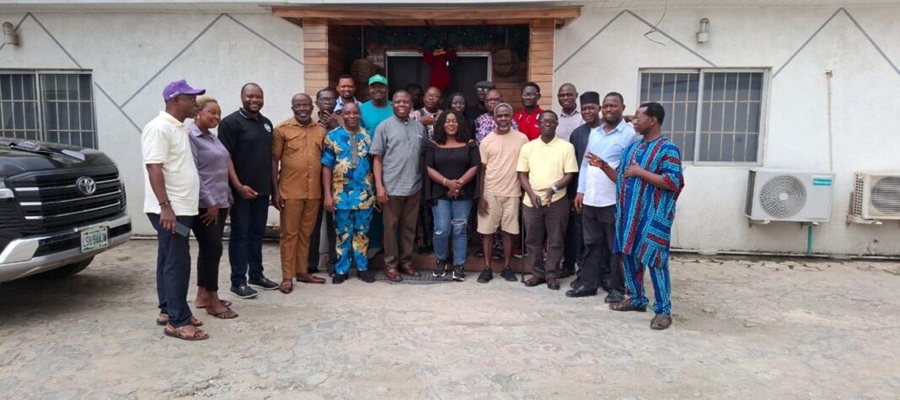Broadcasting
Rural Renaissance: 5G Technology Revolutionizes Digital Communication and the Creative Industry

By Oyeronke George
In the tranquil expanse of rural landscapes, a technological revolution is quietly unfolding. The advent of 5G technology promises to transform these areas, sparking a renaissance that will redefine digital communication and invigorate the creative industry. As a professional deeply immersed in both digital innovation and the arts, I am thrilled to explore how 5G can bridge the digital divide and unleash a wave of creativity in rural communities.

The 5G Revolution
Imagine downloading an entire HD movie in seconds, streaming a live concert from a countryside barn, or engaging in virtual reality art exhibits with zero lag. 5G technology, with its ultra-fast speeds and seamless connectivity, makes this possible. For rural areas, often plagued by slow and unreliable internet, 5G is a game-changer. It promises not just better connectivity but a leap into the future of digital communication.
Economic and Creative Growth
The impact of 5G on rural economies will be profound. Enhanced connectivity can attract new businesses, support local entrepreneurs, and enable small and medium-sized enterprises (SMEs) to compete globally. E-commerce platforms, digital marketing, and online services become viable, bringing new vitality to local economies.
For the creative industry, the potential is limitless. Artists, musicians, filmmakers, and other creatives can now share their work with the world without the constraints of slow internet. They can collaborate globally, participate in virtual workshops, and host live-streaming events, fostering a vibrant creative ecosystem that knows no geographical bounds.
Transforming Education and Healthcare
Education and healthcare are set to benefit enormously from 5G. Students in remote areas can access the same quality of online resources and interactive classes as their urban peers, leveling the educational playing field. In healthcare, telemedicine can become a lifeline, offering real-time consultations, remote monitoring, and advanced diagnostics, significantly improving health outcomes for rural residents.
Overcoming Challenges
Rolling out 5G in rural areas isn’t without challenges. The primary hurdle is the significant investment required for infrastructure. However, leveraging existing structures, public-private partnerships, and government subsidies can help bridge this gap. Additionally, digital literacy programs are essential to ensure residents can fully utilize 5G, maximizing its benefits.
Policy and Collaboration
Government policy is crucial in facilitating 5G expansion. Strategic initiatives like spectrum allocation, financial incentives, and supportive regulations create an environment conducive to investment and innovation. Collaboration between telecom companies, local governments, and community organizations is vital for a successful rollout.
A New Era of Creativity
As a photographer and creative director, I see boundless possibilities through the lens of 5G. This technology isn’t just about faster internet; it’s about transforming rural areas into vibrant hubs of creativity and innovation. Imagine a world where artists in remote villages can seamlessly collaborate with peers across the globe, where a musician can live-stream a concert from a countryside barn to an international audience, or where a filmmaker can upload a high-definition short film in seconds.
5G technology breaks down barriers that have long isolated rural communities from the broader digital economy. It fosters connections by enabling real-time interactions and collaborations that were previously impossible. Creatives in rural areas can now access global platforms to showcase their work, find inspiration, and connect with mentors and audiences from around the world. This interconnectedness can spark a surge of creativity and cultural exchange, enriching both rural and urban communities.
Moreover, 5G facilitates the creation and sharing of high-quality content. Photographers can upload and edit large files quickly, musicians can produce and distribute their music more efficiently, and digital artists can engage in real-time virtual reality projects. The enhanced capabilities of 5G allow for more complex and interactive forms of art, pushing the boundaries of what is creatively possible.
The transformation goes beyond individual creatives. With 5G, rural areas can develop into cultural hubs, attracting tourists, investors, and new residents. Art festivals, digital exhibitions, and creative workshops can be hosted in these regions, drawing attention and resources. This influx can rejuvenate local economies and create a symbiotic relationship between technology and culture.
Educational institutions in rural areas stand to gain significantly from 5G. Schools can offer students access to cutting-edge digital tools and resources, from virtual reality field trips to online courses taught by world-renowned experts. This access can inspire the next generation of creatives, equipping them with the skills and knowledge to thrive in a digital world.
Healthcare, too, benefits from this technological leap. Telemedicine can enable artists and creatives with health issues to consult with specialists without having to travel long distances. Mental health support, crucial for creatives, can be more accessible, fostering a healthier and more productive creative community.
The dawn of 5G in rural areas heralds a new era—one where digital communication flourishes and the creative industry thrives. It’s about more than just technology; it’s about empowering individuals, communities, and cultures. It’s about creating opportunities where there were none and ensuring that everyone, regardless of their location, can participate in and contribute to the global creative economy.
Let’s embrace this rural renaissance and work together to make this vision a reality. By leveraging the power of 5G, we can transform rural areas into beacons of creativity and innovation, fostering a more connected, inclusive, and vibrant society. The future of creativity is bright, and with 5G, it’s within reach for everyone.
Broadcasting
Tim Akano Recounts 20-Year Growth, Media Support at NITRA End-of-Year Meet

Mr. Tim Akano, New Horizons Chief Executive Officer, took centre stage at the Nigerian Information Technology Reporters’ Association (NITRA) annual end-of-year meeting on Thursday, December 18, 2025, recounting the company’s remarkable growth and reaffirming free IT training for journalists.

Tim Akano, New Horizons Chief Executive Officer, in a group photograph with NITRA Members
Speaking directly to IT media members at the company’s training facility in Lagos, Akano acknowledged the critical role journalists played in supporting New Horizons during its formative years two decades ago.
He detailed how the firm evolved from a handful of staff to one of Africa’s leading ICT skills training organisations, now employing about 500 staff across multiple training centres nationwide.
Akano Spotlights Youth Training, University Partnerships
Akano highlighted that New Horizons has trained over 500,000 youths, particularly tertiary institution students, equipping them with practical IT skills essential for Nigeria’s digital economy.
He announced recent partnerships with universities, including a new agreement with Afe Babalola University, to scale hands-on training programmes for students.
“This growth would not have been possible without the media’s support in documenting our journey,” Akano stated, pledging continued free IT skills training for media members to remain competitive in the evolving digital landscape.
Reciprocal Support Defines Long-Standing Partnership
The venue hosting the NITRA meeting underscored Akano’s generosity; NITRA Secretary Chidiebere Nwankwo secured the free facility after contacting him—a gesture consistent with New Horizons hosting multiple association events and training IT journalists since its inception 20 years ago.
Participants shared personal testimonies of Akano’s support, including veteran journalist Aaron Ukodie, whose daughter—an Accounting graduate from the University of Johannesburg—received NYSC placement and IT scholarship at New Horizons.
The Guardian’s Yemi Adeyemi recounted Akano accommodating his editor’s child for mandatory IT training after other firms declined.
Members praised Akano’s commitment to human capital development as evidence of deep appreciation for the media community that chronicled New Horizons’ success over two decades.
Broadcasting
NIMC rolls out Pre-Enrolment Portal for seamless NIN registration

National Identity Management Commission (NIMC) has launched the NIMC Pre-Enrolment Portal to revolutionise the National Identification Number (NIN) enrolment process, enabling applicants within Nigeria and in the Diaspora to capture biodata online prior to biometric verification at enrolment centres.

NIMC
Accessible via penrol.nimc.gov.ng, the platform allows users to fill enrolment forms, schedule appointments, upload supporting documents securely, and manage personal details directly, thereby slashing congestion, minimising wait times, boosting data accuracy and enhancing overall service efficiency at centres nationwide.
NIMC Director-General and CEO, Engr. (Dr) Abisoye Coker-Odusote, spearheaded the initiative as part of the Commission’s technology-driven strategy to fortify institutional performance, aligning with President Bola Ahmed Tinubu’s Renewed Hope Agenda that emphasises digital transformation, efficient public service delivery and inclusive national development.
Dr Kayode Adegoke, Head of Corporate Communications, highlighted key benefits including simplified biodata handling, confidential data protection through robust security measures, reduced physical centre visits and heightened operational effectiveness, urging all prospective enrollees to adopt the portal for a faster, citizen-friendly experience.[conversation_history]
The move underscores NIMC’s mandate under the NIMC Act No. 23 of 2007 to manage the National Identity Database, issue NINs and foster a reliable digital identity ecosystem vital for national planning, with users advised to complete pre-enrolment online before heading to selected centres for biometrics.
Broadcasting
MultiChoice Talent Factory Calls for Entries Into Fully Funded Film Training Programme

MultiChoice Talent Factory (MTF), a Pan-African film and television training institution, has announced the opening of applications for its 2026 intake.

MultiChoice
The fully funded programme is open to African graduates aspiring to become directors, filmmakers, scriptwriters, producers and storytellers.
According to MultiChoice, the nine-month accredited curriculum combines online learning with intensive in-person training, and is designed to balance theoretical knowledge with practical immersion.
MTF academies are located in Kenya, Nigeria and Zambia, and serve aspiring filmmakers from 14 African countries. Since its inception in 2018, the initiative has trained 296 filmmakers, with graduates producing more than 42 movies aired on DStv, GOtv and Showmax platforms.
Organisers said alumni of the programme have gone on to establish over 50 production companies, while many continue to work within the MultiChoice ecosystem.
Graduates have also won accolades at the Africa Magic Viewers’ Choice Awards, Kalasha Awards, Uganda Film Festival and Women in Film Awards.
Applications for the 2026 intake close on Feb. 27, 2026. Interested candidates can visit https://apo-opa.co/3XW53oE for programme requirements.

 E-Financial3 days ago
E-Financial3 days agoFIRS says NIN, CAC Numbers to Serve as Tax IDs from 2026

 E-Financial3 days ago
E-Financial3 days agoAfDB Group Mobilises Global Private Capital to Close Africa’s Financing Gap

 Telecom3 days ago
Telecom3 days agoOyedele Dismisses Claims Bank Accounts Without TIN Will Be Frozen

 E-Financial3 days ago
E-Financial3 days agoFidelity Bank Bolsters Ikoyi Fire Station with Hoses, Pumps for Safer Communities

 General News2 days ago
General News2 days agoWoherem Proposes Pragmatic Roadmap to End Terrorism and Banditry in Nigeria

 News2 days ago
News2 days agoFIRS Declares NIN, CAC Numbers as Tax IDs from 2026

 Telecom3 days ago
Telecom3 days agoAmazon Blocks 1,800 North Koreans From Job Applications

 E-Financial2 days ago
E-Financial2 days agoWorld Bank Reveals Obstacles to Growth of Mobile Money Accounts in Sub-Saharan Africa


















